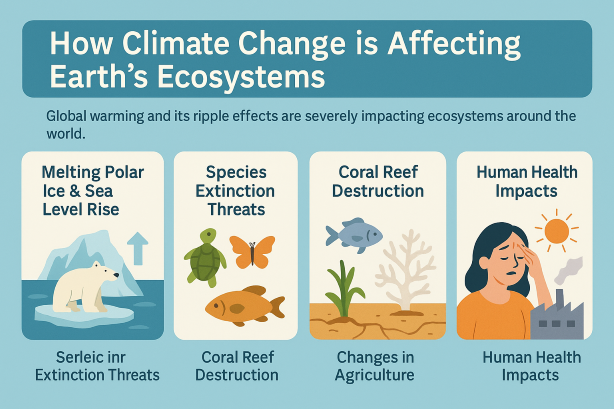Introduction
Climate change is no longer a distant threat—it’s happening here and now. Rising global temperatures are reshaping ecosystems, endangering species, and directly affecting human life. From melting polar ice to shifting agricultural patterns, the ripple effects of global warming touch every corner of our planet. Let’s break down how climate change is changing Earth’s ecosystems and why urgent action is needed.
Melting Polar Ice & Sea Level Rise
One of the most visible impacts of climate change is the rapid melting of ice in the Arctic and Antarctic. This isn’t just about shrinking glaciers—it’s fueling sea level rise, threatening coastal cities, and altering habitats for polar bears, penguins, and other species. Communities near shorelines are already facing flooding risks, forcing some populations to relocate.
Species Extinction Threats
Rising temperatures disrupt ecosystems that many animals rely on for survival. Species like amphibians, bees, and even elephants are struggling as their habitats shrink or change. Scientists warn that 1 in 6 species could face extinction if global warming continues unchecked.
Coral Reef Destruction
Coral reefs—home to 25% of marine life—are highly sensitive to rising ocean temperatures. When waters get too warm, corals expel the algae that give them color and life, leading to coral bleaching. Without intervention, many reefs could vanish, destroying marine biodiversity and harming communities that depend on fishing and tourism.
Changes in Agriculture
Farmers worldwide are already experiencing the effects of climate change. Droughts, unpredictable rainfall, and extreme weather make it harder to grow staple crops like wheat, rice, and maize. As a result, food insecurity is on the rise, especially in vulnerable regions. On the flip side, some areas may see longer growing seasons, but the risks outweigh the benefits.
Human Health Impacts
Climate change isn’t just an environmental issue—it’s a public health crisis. Rising temperatures contribute to heat-related illnesses, vector-borne diseases (like malaria and dengue), and respiratory problems from air pollution. Poor air quality, unsafe water, and extreme weather events make human survival more challenging.
Conclusion: Call for Urgent Action
The effects of climate change on Earth’s ecosystems are undeniable and escalating. But there’s still time to act. By reducing carbon emissions, supporting renewable energy, and protecting vulnerable ecosystems, humanity can slow the damage. The responsibility lies with all of us—to act now, so future generations inherit a healthier, safer planet.




